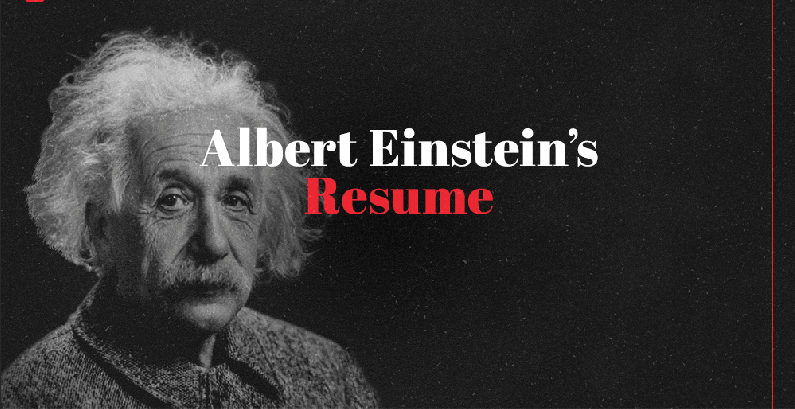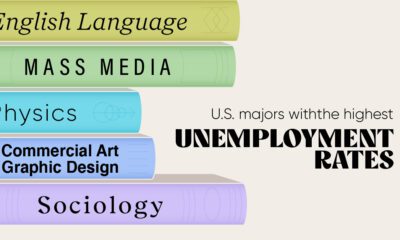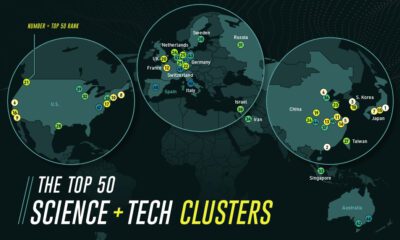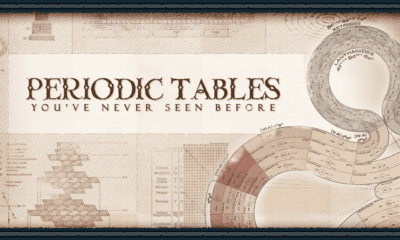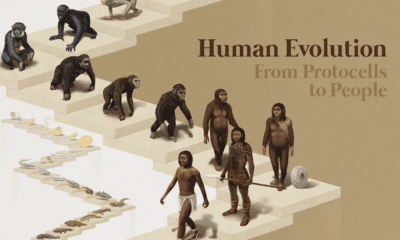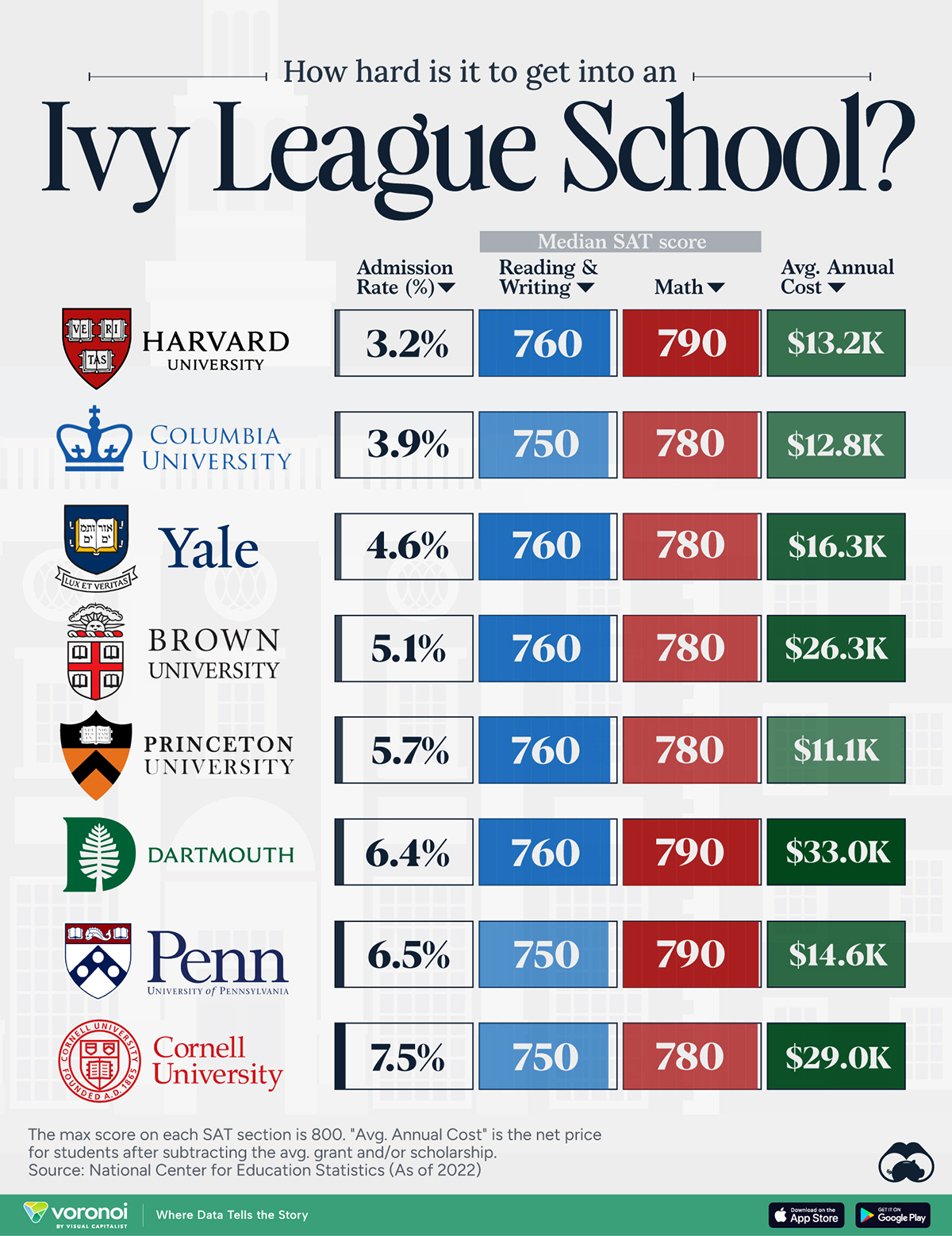Misc
Timeline: The Incredible Life of Albert Einstein
Albert Einstein was one of the most brilliant and influential mathematical physicists in human history. Even 62 years after his passing, he is still widely regarded as the prototypical genius.
Today’s timeline from KickResume is an inventive and entertaining look at Einstein’s life and achievements.

Younger Life
Albert Einstein was born on March 14, 1879, in the German city of Ulm. From an early age, Einstein was fascinated by mathematics, science, and music.
While he would eventually go on to reveal the inner workings of the universe, Einstein struggled as a student, failed exams, and had dust-ups with authority figures.
In 1903, he married a former classmate, Mileva Marić, though his parents disapproved. Recently discovered letters indicate that Marić – who was also a physicist – may have contributed significantly to his groundbreaking work. The couple had a daughter in 1902 (who was given up for adoption), and later had two sons.
Annus Mirabilis
In 1905, Albert Einstein was working as a clerk in the patent office in Bern, Switzerland. The 26-year-old had only recently submitted his doctoral thesis to the University of Zurich, but was hard at work writing four papers in a single year that would eventually turn the world of science on its head. That is why 1905 is often referred to as an annus mirabilis (or “miraculous year” in Latin).
To summarize: Albert Einstein laid the foundation of quantum physics, introduced special relativity, and established the scientific basis of nuclear energy in his spare time.
From Science Star to Supernova
By 1919, while working as a professor of theoretical physics at the University of Berlin, Einstein theorized that an impending solar eclipse would provide a rare opportunity to observe gravity’s effect on light. When reports came back that his predictions were proven correct, it not only sent a shock-wave through the scientific community, but the whole world.
New Theory of the Universe. Newtonian Ideas Overthrown.
– Headline in the London Times
Years after Einstein’s miracle year, his immense accomplishments started to become common knowledge. The physicist, now an overnight celebrity, spent the next few years traveling, doing speaking engagements, and collecting awards. He was also a founder of the Hebrew University in Jerusalem in 1921, and won a Nobel Prize that same year.
Albert Einstein was an outspoken pacifist and Jew, so as Hitler rose to power in Germany, he made the decision to emigrate to the United States. He accepting a position at the Institute for Advanced Study in Princeton, New Jersey. The physicist would never set foot in the country of his birth again.
Einstein and the Atomic Era
A month before World War II, Einstein and his colleague, Leo Szilárd, wrote numerous letters to President Franklin D. Roosevelt sounding the alarm that Germany was developing “extremely powerful bombs of a new type”. The President took the letters seriously and soon after, the Advisory Committee on Uranium (a precursor to the Manhattan Project) was created.
Einstein carried the guilt of his role in sparking the development of atomic weapons, and he would continue to speak out against their use throughout the 1940s and onward.
The Fight For Equality
Seeing the parallels between the treatment of Jews in Germany and African Americans in his adopted country, Einstein became a member of the National Association for the Advancement of Colored People (NAACP). He campaigned for civil rights and in a famous speech at Lincoln University, he labeled racism “a disease of white people,” and added, “I do not intend to be quiet about it.”
Later Life
In 1952, Einstein declined an offer from Israel’s premier, David Ben-Gurion, to become president of Israel.
At the age of 76, Einstein suffered an abdominal aortic aneurysm, but opted against surgery upon arriving at the hospital. “I want to go when I want,” he stated at the time. “It is tasteless to prolong life artificially. I have done my share, it is time to go. I will do it elegantly.” Albert Einstein died in his sleep on April 18, 1955.
Though the man himself is gone, the legacy and unique world-view of the eccentric physicist continues to influence and inspire humanity to this day.
Misc
How Hard Is It to Get Into an Ivy League School?
We detail the admission rates and average annual cost for Ivy League schools, as well as the median SAT scores required to be accepted.
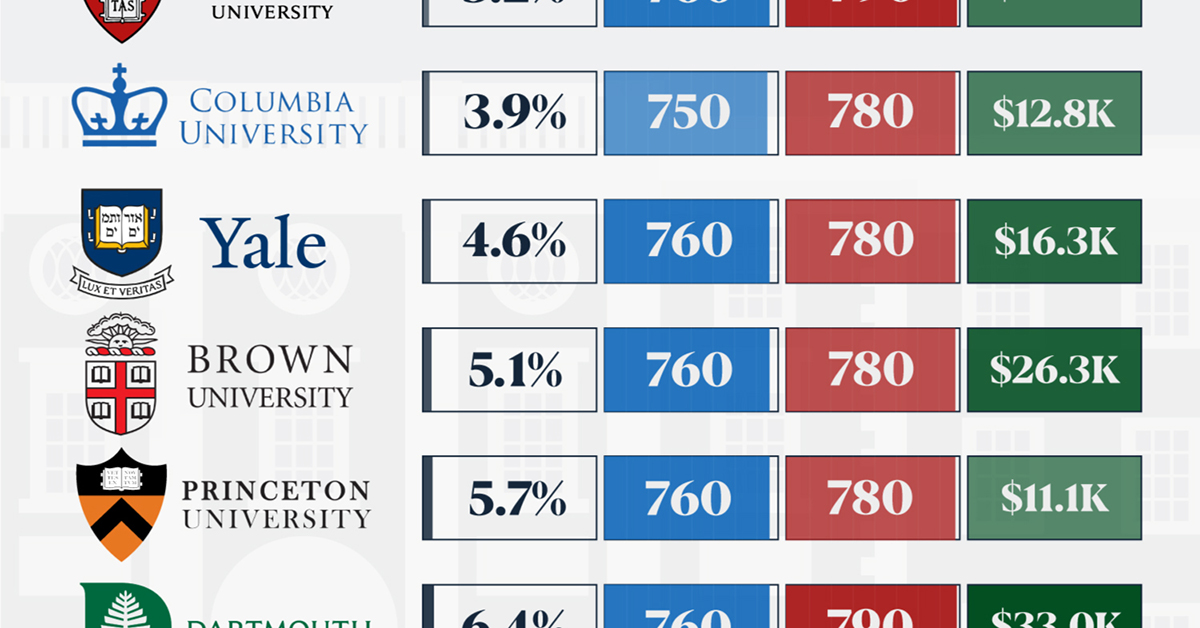
How Hard Is It to Get Into an Ivy League School?
This was originally posted on our Voronoi app. Download the app for free on iOS or Android and discover incredible data-driven charts from a variety of trusted sources.
Ivy League institutions are renowned worldwide for their academic excellence and long-standing traditions. But how hard is it to get into one of the top universities in the U.S.?
In this graphic, we detail the admission rates and average annual cost for Ivy League schools, as well as the median SAT scores required to be accepted. The data comes from the National Center for Education Statistics and was compiled by 24/7 Wall St.
Note that “average annual cost” represents the net price a student pays after subtracting the average value of grants and/or scholarships received.
Harvard is the Most Selective
The SAT is a standardized test commonly used for college admissions in the United States. It’s taken by high school juniors and seniors to assess their readiness for college-level academic work.
When comparing SAT scores, Harvard and Dartmouth are among the most challenging universities to gain admission to. The median SAT scores for their students are 760 for reading and writing and 790 for math. Still, Harvard has half the admission rate (3.2%) compared to Dartmouth (6.4%).
| School | Admission rate (%) | SAT Score: Reading & Writing | SAT Score: Math | Avg Annual Cost* |
|---|---|---|---|---|
| Harvard University | 3.2 | 760 | 790 | $13,259 |
| Columbia University | 3.9 | 750 | 780 | $12,836 |
| Yale University | 4.6 | 760 | 780 | $16,341 |
| Brown University | 5.1 | 760 | 780 | $26,308 |
| Princeton University | 5.7 | 760 | 780 | $11,080 |
| Dartmouth College | 6.4 | 760 | 790 | $33,023 |
| University of Pennsylvania | 6.5 | 750 | 790 | $14,851 |
| Cornell University | 7.5 | 750 | 780 | $29,011 |
*Costs after receiving federal financial aid.
Additionally, Dartmouth has the highest average annual cost at $33,000. Princeton has the lowest at $11,100.
While student debt has surged in the United States in recent years, hitting $1.73 trillion in 2023, the worth of obtaining a degree from any of the schools listed surpasses mere academics. This is evidenced by the substantial incomes earned by former students.
Harvard grads, for example, have the highest average starting salary in the country, at $91,700.
-
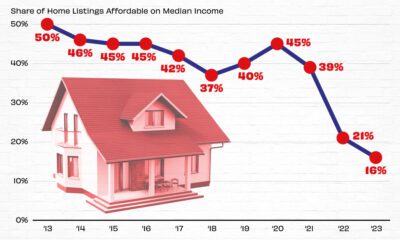
 Real Estate2 weeks ago
Real Estate2 weeks agoVisualizing America’s Shortage of Affordable Homes
-

 Technology1 week ago
Technology1 week agoRanked: Semiconductor Companies by Industry Revenue Share
-

 Money1 week ago
Money1 week agoWhich States Have the Highest Minimum Wage in America?
-

 Real Estate1 week ago
Real Estate1 week agoRanked: The Most Valuable Housing Markets in America
-

 Business2 weeks ago
Business2 weeks agoCharted: Big Four Market Share by S&P 500 Audits
-
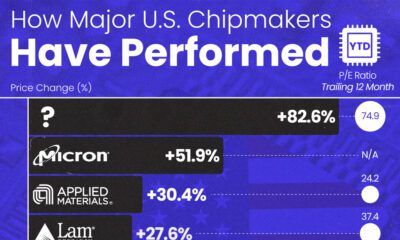
 AI2 weeks ago
AI2 weeks agoThe Stock Performance of U.S. Chipmakers So Far in 2024
-

 Misc2 weeks ago
Misc2 weeks agoAlmost Every EV Stock is Down After Q1 2024
-
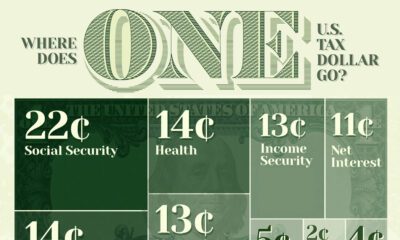
 Money2 weeks ago
Money2 weeks agoWhere Does One U.S. Tax Dollar Go?

